Alumni Reflections on Vic One
Gooch Stream - Mark Khalil
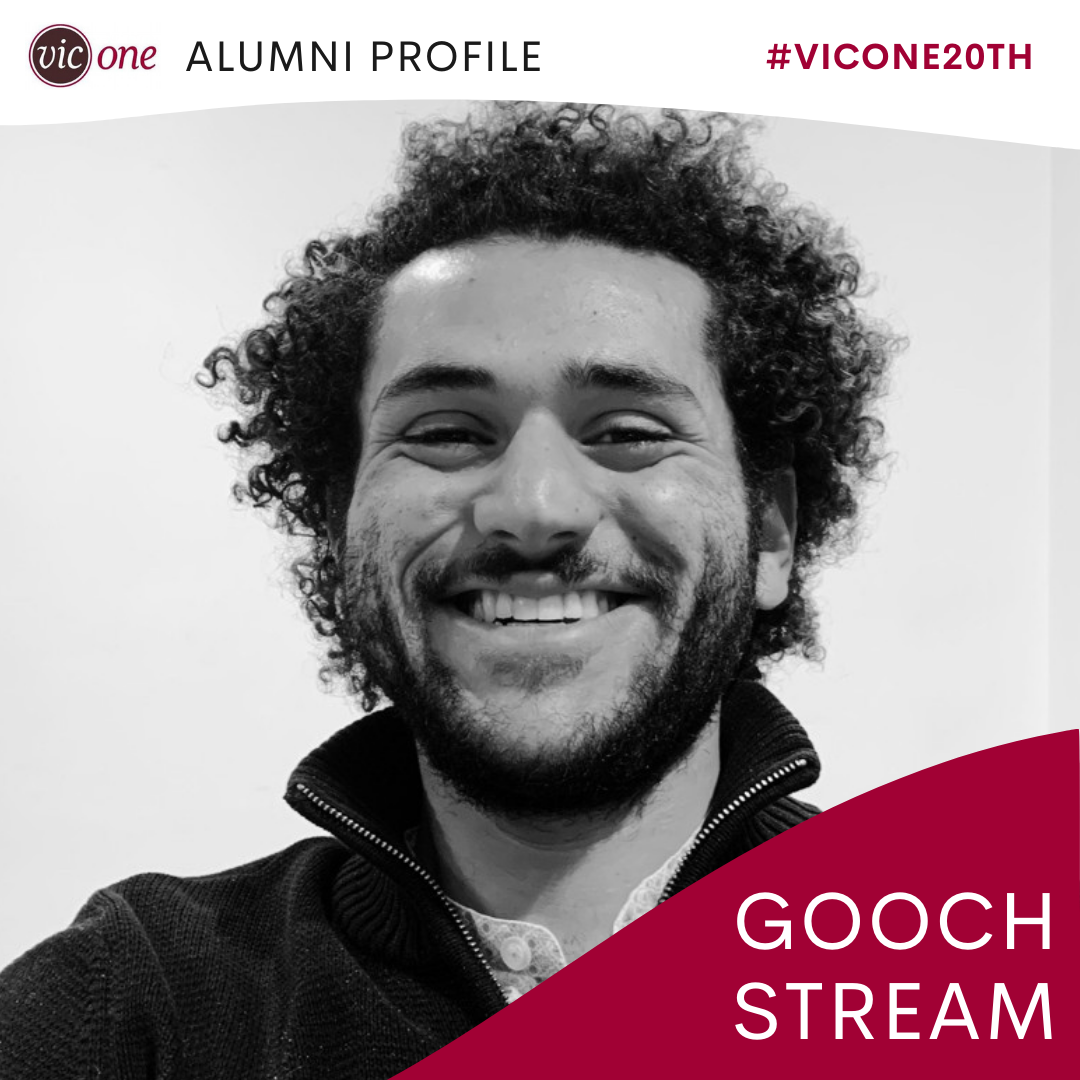
Tell us about what you’re currently doing and/or any accomplishments you would like to highlight.
I am currently working in venture capital, investing in startups in Africa. I finished UofT and then went to Yale to do my Master's in Development Economics. I am starting further graduate studies at Stanford in September.
How did your Vic One experience influence or contribute to your academic and professional goals?
I think Vic One provided me with such a wonderful community of friends, many of which I am still in touch with today. In addition, the Paul Gooch stream in Ethics and Philosophy gave me a solid introduction to thinking critically about questions such as what it means to be a good life, what makes an action moral or immoral, how can one achieve happiness, what are the virtues and vices and what makes them so, and other questions that have guided me in my professional life as well as my personal life.
What are your favourite memories of Vic One?
The last class with Paul Gooch, where he told us the secret to a happy life and read us a beautiful passage. It was a pretty emotional day, and an incredibly memorable lesson on the centrality of love.
What advice would you offer to your past self/current and future Vic One students?
Get to know your professors more, they are really cool people. Ask them for a coffee?
Stowe Gullen Stream - Emily Swinkin
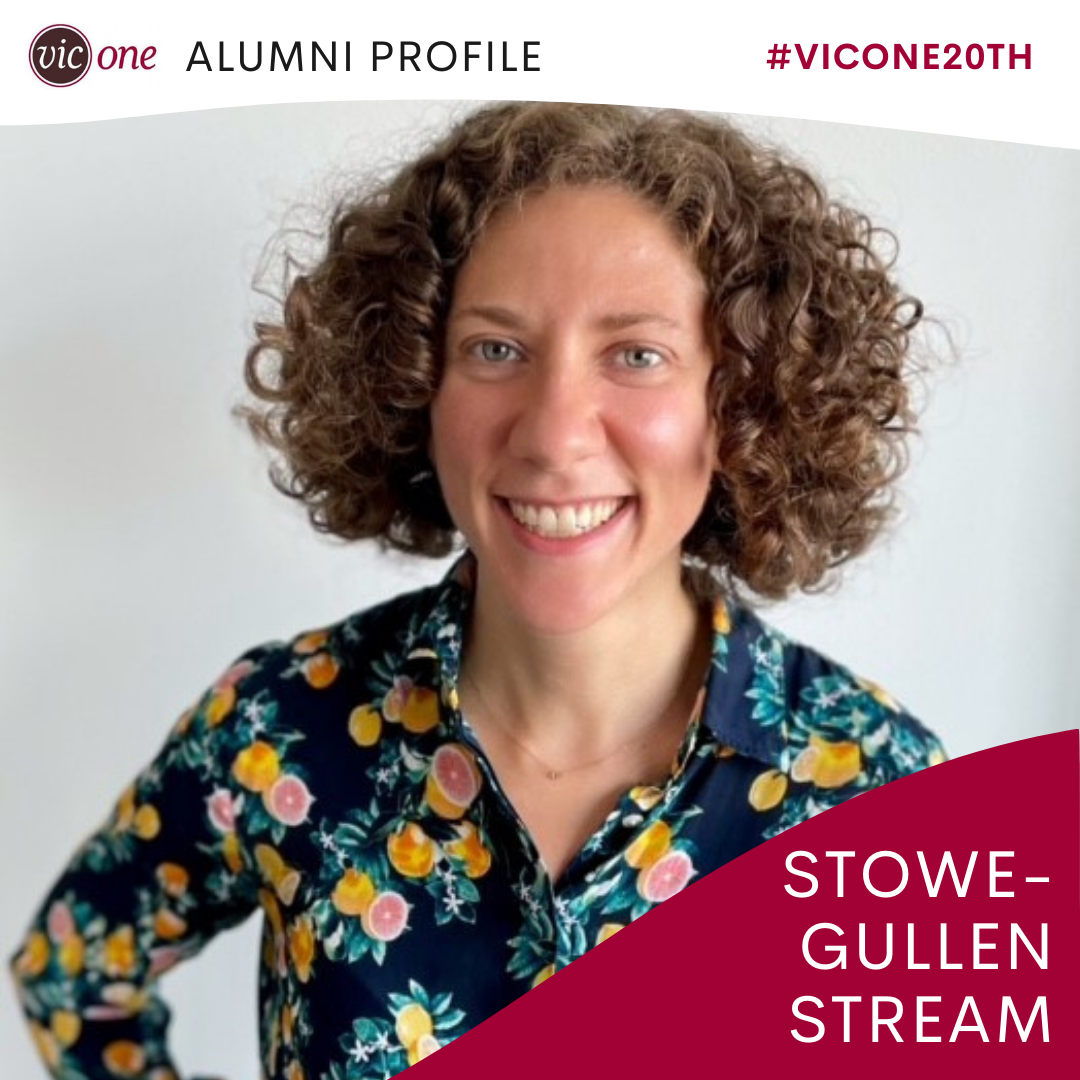
Tell us about what you’re currently doing and/or any accomplishments you would like to highlight.
I'm currently working as a neurologist, specializing in movement disorders, at Toronto Western Hospital and the Centre for Addiction and Mental Health. As part of my work, I am an assistant professor and clinician-teacher in the University of Toronto Departments of Medicine and Psychiatry. I spend most of my time working in outpatient clinical practice but also enjoy teaching trainees from medical school through residency and working as a principal investigator for clinical trials in Parkinson's disease. Outside of work, I love reading and writing poetry (a hobby since my Vic One days...and proud winner of the Goodison Chamberlain poetry prize in 2007!). I was honoured to receive an MD Program Teaching Award for Excellence for my work with medical students and to have made the longlist of the CBC poetry prize in 2021.
How did your Vic One experience influence or contribute to your academic and professional goals?
The classes that I took in the Stowe-Gullen stream helped to develop my skills in critical thinking and communication in science and more broadly. I knew that I wanted to pursue medicine and this early exposure and training in scientific rhetoric and methods spurred my interest in academic medicine. It laid the foundation for the communication skills that I have come to rely on in scientific publishing and giving presentations to a variety of audiences from medical grand rounds to lay audience Parkinson's advocacy groups. The breadth and interdisciplinary nature of Vic One as a whole also reinforced the importance of maintaining broad interests and collaborations. One of my guiding principles is that the study and practice of medicine/science is enhanced by narrative and understanding of historical and social contexts; listening to peoples' stories is key.
What are your favourite memories of Vic One?
Spending time with my cohort of Stoweners outside of class (working on statistics problems, group projects, or just hanging out) - it was a tight knit group and I gained so many good friends. Get-togethers at Prof. Baines' house were a real treat. I also loved just hanging out with whichever Vic One friends were in Burwash Hall; it was such a welcoming community!
What advice would you offer to your past self/current and future Vic One students?
Use this time to take a broad range of courses that interest you. Don't worry if you're taking an unconventionally mixed courseload (as long as you have the prerequisites to ultimately graduate...don't be shy to check in with a registrar advisor to map out your options). Taking classes that you enjoy and that challenge you in different ways will set you up for whatever comes next. Also, get involved in groups and clubs - connect with friends! You can never be certain about the path ahead but you can't go wrong with a curious mind and a good group of friends.
Education Stream - Tania Lim
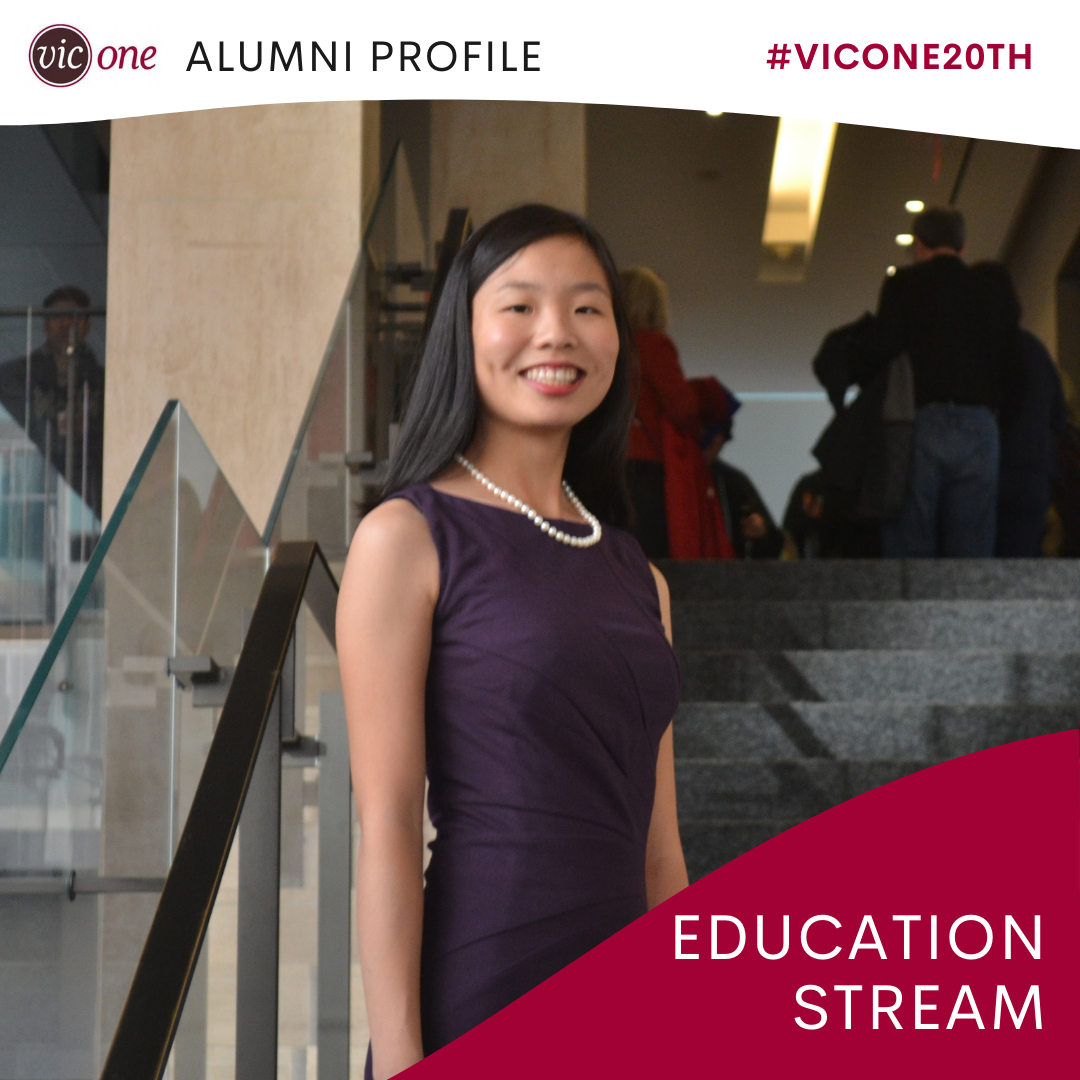
Tell us about what you’re currently doing and/or any accomplishments you would like to highlight.
I'm currently in my 10th year with the Toronto District School Board, teaching Grade 1 in the French Immersion Program. I am also a vocal and piano coach in my spare time, teaching students of all ages across the city.
How did your Vic One experience influence or contribute to your academic and professional goals?
My time in Vic One gave me excellent mentors and a home base for my entire time at U of T. It reaffirmed my passion for teaching and helped me to meet like-minded peers. I later started the Hey, Teach! Magazine with my Vic One peers and got plenty of teaching experience through the Vic Reach program. Vic One was one of the only small-group/intimate learning environments that I had as a first-year life sciences student. My Vic One professor, the late Dr. Sheila Cook had a profound impact on my life both personally and professionally and I would not have had the privilege of meeting her had it not been for the Vic One program.
What are your favourite memories of Vic One?
I enjoyed it when we shared our philosophies of education at the end of Vic One. It was amazing to see how we had grown in just one year together. I also really loved the plenary sessions - especially the one with the great children's performer, Raffi! I think of that day sometimes when I'm singing his songs with my daughter.
What advice would you offer to your past self/current and future Vic One students?
I would say take the time to enjoy and explore all the great opportunities that Vic One has to offer. There are so many generous people in this community to learn from and to help you along the way. Back when we were starting Hey, Teach! magazine, it actually didn't take too much to get our idea off the ground. We quite quickly secured funding and faculty sponsorship, had an eager group of writers from different cohorts of Vic One's education stream, and even had a meeting space generously provided by Professor David Cook, who was the principal at the time. That's just the kind of community it was during my time at Vic and it all started with Vic One.
Jewison Stream - Ivana Dizdar
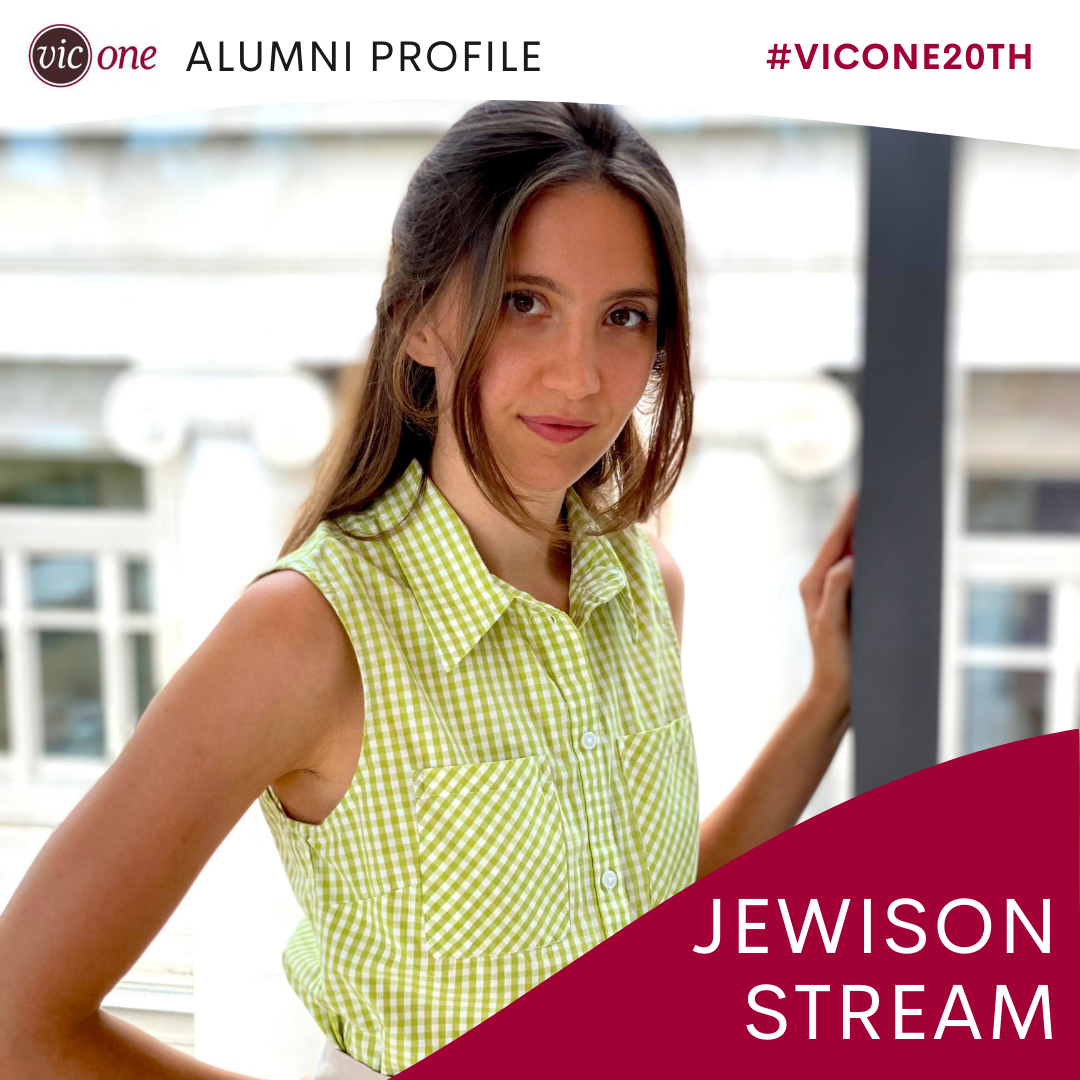
Tell us about what you’re currently doing and/or any accomplishments you would like to highlight.
I’m an art historian and curator. As of 2020, I’m back at UofT pursuing a PhD, and this year I’m based at Princeton University as a visiting researcher. Until recently, I was on the curatorial team at the National Gallery of Canada, where I worked on the major retrospective “General Idea,” which, after its run in Ottawa, is touring to the Stedelijk Museum in Amsterdam and the Gropius Bau in Berlin. Now I’m super excited to be curating the first retrospective of work by Canadian performance art collective The Clichettes, which opens at the McMaster Museum of Art in 2024.
How did your Vic One experience influence or contribute to your academic and professional goals?
Vic One’s Norman Jewison Stream for Imagination and the Arts helped me understand the ways in which art not only represents and responds to but also informs and shapes politics, society, and the world we live in. I became endlessly motivated to gain a deeper understanding of the complex intersections between art and geopolitics in particular, both historical and contemporary. This motivation drove my undergraduate and graduate studies, and it remains at the heart of my academic and curatorial work.
What are your favourite memories of Vic One?
A definite highlight of my Vic One experience was the opportunity to meet and be in dialogue with Norman Jewison—a director whose work epitomizes the deep links between art, politics, and social change.
I have countless memories of moments that were intellectually formative, but some of my favorite—and equally important—moments were those spent in discussion, debate, and diversion with fellow Vic One students. Some of my peers in the program (most notably Jess Shane, a radio producer, and Arshile Egoyan, a filmmaker) remain great friends and we continue to influence each other’s work.
What advice would you offer to your past self/current and future Vic One students?
Engage, collaborate, and form friendships with people across generations. (Some of my closest friends are in their mid 70s.) Having strong mentors is transformative, and it can be just as enriching to be a mentor yourself. You’re never too young to be a mentor.
Don’t preoccupy yourself with planning every step of your academic and professional trajectory in advance. The fact is: things won’t turn out the way you planned them. Accept opportunities you’re excited about and your path will materialize organically.
If you struggle with writer’s block (who doesn’t?), try this: write the worst possible version of the text—then edit, edit, edit, and, pretty soon, it will become the best possible version. A friend of mine uses another trick I like: try writing in a goofy font (like Comic Sans) and the process will feel much less intimidating.
Are there any other thoughts or insights that you’d like to share?
In addition to my work as an art historian and a curator, I’m a practicing artist. Making and exhibiting my work has been stimulating and rewarding in its own right, but it’s also taught me to be a better thinker, researcher, writer, curator, and champion of other artists. I mention this as a lead-in to another nugget of advice: Don’t let anyone tell you you need to stick to a single practice, project, or discipline. Experimentation and production in different areas will strengthen your work, and will keep things consistently challenging, interesting, and fun.
Pearson Stream - Ikran Jama
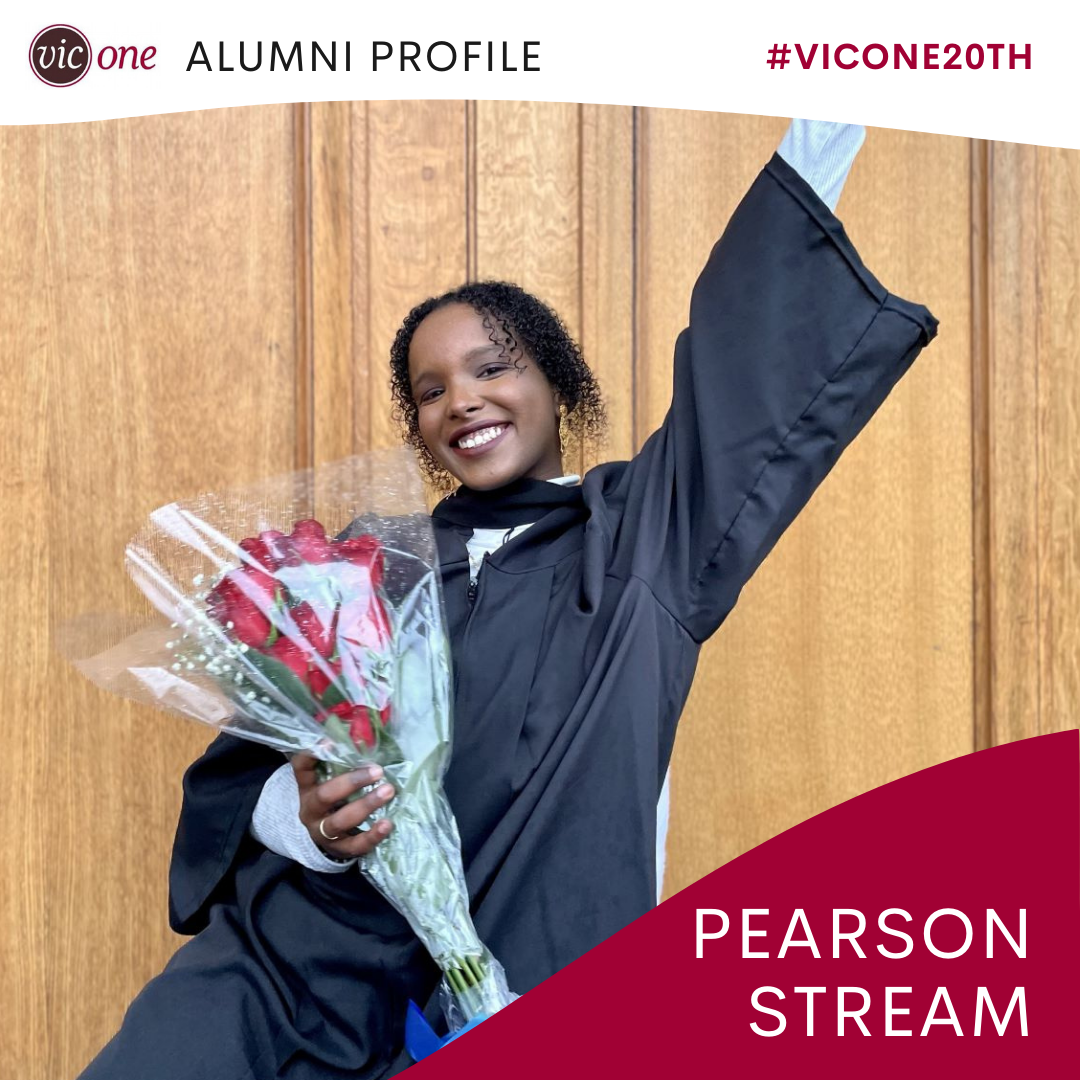
Tell us about what you’re currently doing and/or any accomplishments you would like to highlight.
In my final year at U of T, I was awarded the Rhodes Scholarship which has allowed me to pursue two master’s degrees at the University of Oxford. Last year, I completed an MSc in Criminology and Criminal Justice and I’m currently completing an MSc in Refugee and Forced Migration Studies. My research focuses on the intersection of citizenship, migration, and the law in the hopes to better understand how refugee and immigrant communities are impacted by the criminal justice system and how they can be best supported. After my time here at Oxford, I’m excited to return to UofT this fall to start studies at the Faculty of Law!
How did your Vic One experience influence or contribute to your academic and professional goals?
Through Vic One, I found a wholesome community of friends and mentors who not only supported me throughout my time at U of T but continue to do so to this day. The Pearson Stream helped me to think more critically about global issues and develop a deeper understanding of some of the histories which continue to shape public life. I found it particularly rewarding to be taught by Prof. Wright; I remember thinking how incredible of opportunity it was to learn from an actual Canadian diplomat. The topics undertaken in Pearson invigorated my passion to commit to global change and community service. One of the most important lessons I learned came from Prof. Urbancic which was the importance of recognizing and unearthing gaps in histories and knowledge. This in turn has continued to inform my commitment to understanding and empowering silenced and marginalized narratives in both research and activism.
What are your favourite memories of Vic One?
To start –all the Vic One plenaries! Each session allowed me to learn from several inspiring thinkers, activists, and leaders. I specifically loved how multidisciplinary the plenaries were –I was introduced to and engaged with debates, issues, and insights from outside of my own academic background and worldview. I took several lessons away from each talk and found ways to incorporate them into my own studies and life. However, some of my most cherished memories from Vic One are the moments I spent with my cohort immediately after each of our classes. Often, we would find ourselves discussing and debating long after we had left the classroom. Almost always, we would find a way to keep our conversations going, which usually involved grabbing bubble tea, or sometimes, just sitting in Old Vic for what felt like hours. These moments of friendship, respect, and community consistently reminded me that I had a wonderful support system at the university, and indeed, would for many years to come.
What advice would you offer to your past self/current and future Vic One students?
Don’t be afraid to make some friends!! Find ways to connect with your cohort outside of the classroom. Continue conversations long after class has ended, find common interests outside of academics, and create consistent plans with your fellow classmates. You may not know it at first, but I promise you that many in your cohort will stay involved in your life long after Vic One, and hopefully, long after you’ve graduated U of T. Try to also engage with your professors! Your professors are incredibly talented, knowledgeable, and caring. Take this opportunity to meet with them, learn from them, and carry these lessons forward throughout your undergraduate years and beyond! Finally, take Vic One as an opportunity to adjust into university life. It’s okay to make mistakes on papers and have your arguments challenged. It’s also okay to find it difficult to balance your courseload or find the big lecture halls at U of T overwhelming. Vic One provides that space and time to strengthen your skills as an academic, feel comfortable and empowered enough to engage more in the classroom, and find friends who are making that scary yet exciting transition to university with you. You’ll be engaged, challenged, supported, and most importantly, better equipped to take on the rest of what university has to offer!
Frye Stream - Matt McGeachy
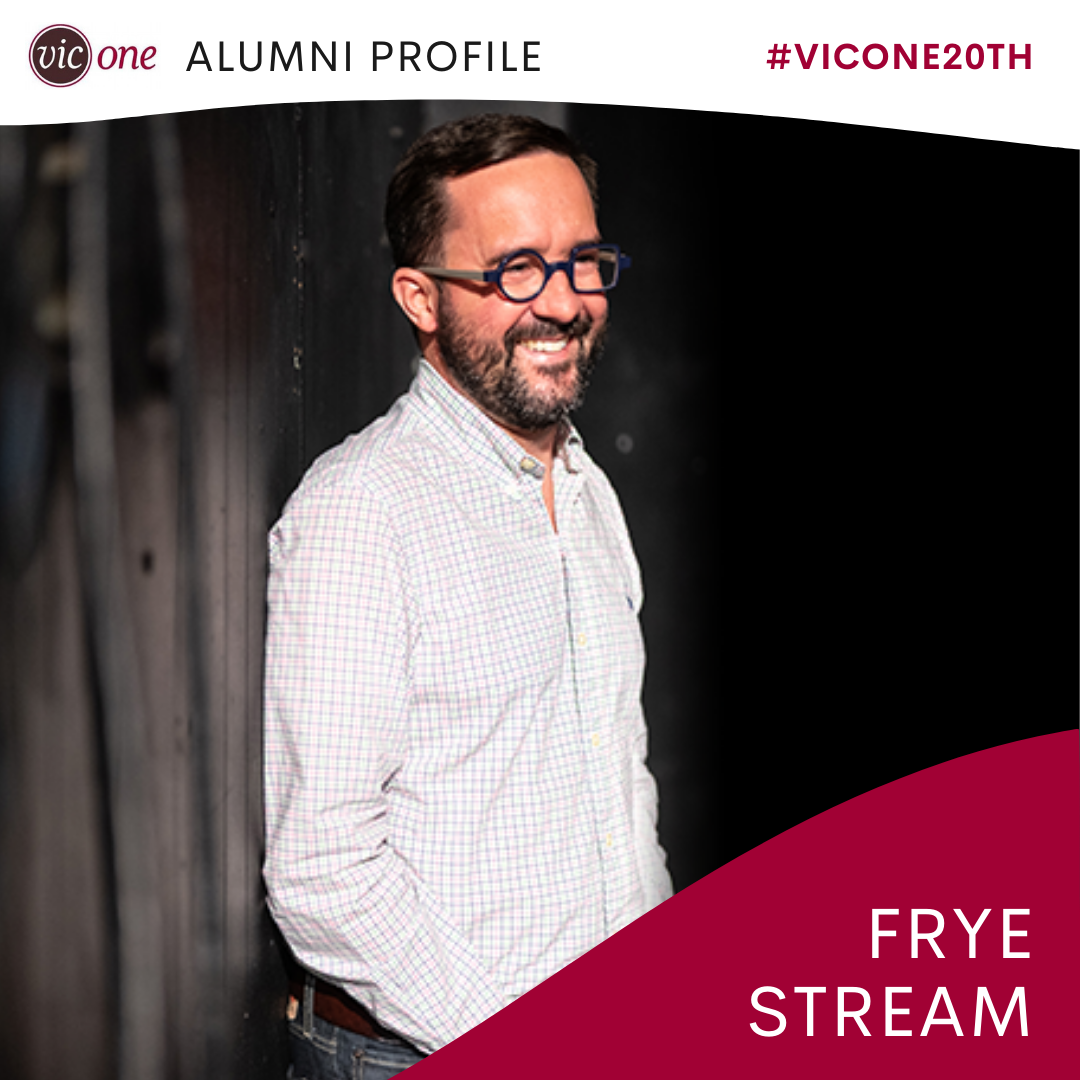
Tell us about what you’re currently doing and/or any accomplishments you would like to highlight.
I am the Manager of Government Relations for the Toronto Symphony Orchestra, where I am accountable for millions of dollars in government funding; devising and executing a comprehensive government relations strategy to demonstrate the vitality and importance of the TSO to the federal, provincial, and municipal governments; board administration; and partnering with our CEO on external communications strategies. I joined the TSO after a career in theatre, including ten seasons as company dramaturge with Factory Theatre in Toronto, and stints at the Guthrie Theatre and Playwrights' Center in Minneapolis, and the Kennedy Center in Washington, D.C. I've had the chance to work with some of the greatest playwrights in the world, helping them to achieve the fullest theatrical potential of their works. Dramaturgy was a great preparation for working with government - it's all about rigour, storytelling, and creating the conditions for artistic expression.
How did your Vic One experience influence or contribute to your academic and professional goals?
Vic One was a transformational experience for me, in that it fostered a way of thinking that prized sitting with problems rather than rushing to solutions; of examining not only the context of something, but the circumstances that gave rise to the possibilities of that context; and an enduring appreciation and commitment to the revolutionary potential of beauty.
What are your favourite memories of Vic One?
Mainly, the enduring friendships that resulted, as well as the enduring intellectual and artistic relationships that were born of my time in Vic One. To this day, I read Milosz from the same (increasingly worn) copy I first bought in Al Moritz's seminar. The structuralists, post-structuralists, Frankfurt School, and Critical Theorists I learned about from Anne Urbancic still form daily partners in thought (though not in writing). Sonia Sedivy's provocations about beauty transformed my life personally and professionally, including teaching Dave Hickey and Alexander Nehamas to my own students. And the challenge to understand the history of the built and ideological monuments that surround us sent me to graduate school in history, thanks to Dennis Duffy. I also valued the people I had the chance to meet in the plenary sessions. Before I was an historian, I got to talk with Margaret MacMillan about Nixon and Mao; before I was a dramaturg, I had coffee and talked theatre with Ann-Marie McDonald; and before I worked in the orchestral field, Andrew Baines took me to my first Tafelmusik concert. It's amazing, really, how many memories are still as vivid for me now as then.
What advice would you offer to your past self/current and future Vic One students?
I have never been as intellectually free as I was as an undergraduate student. As a graduate student, you endure the exciting but painful process of transitioning to being a producer of knowledge rather than a consumer. As a professional, time is scarce and freedom comes in bursts. But as an undergrad, primed by Vic One, I was free to explore. A prof mentioned a book I hadn't read? Check it out and spend the weekend reading. A film you've never seen? Take it out from St. Mike's and watch it in the common room. I guess the advice is: don't let your taste imprison you. Be catholic in your experiences. Provoke yourself. There is no telling where that might lead.
Schawlow Stream - Spencer Ki
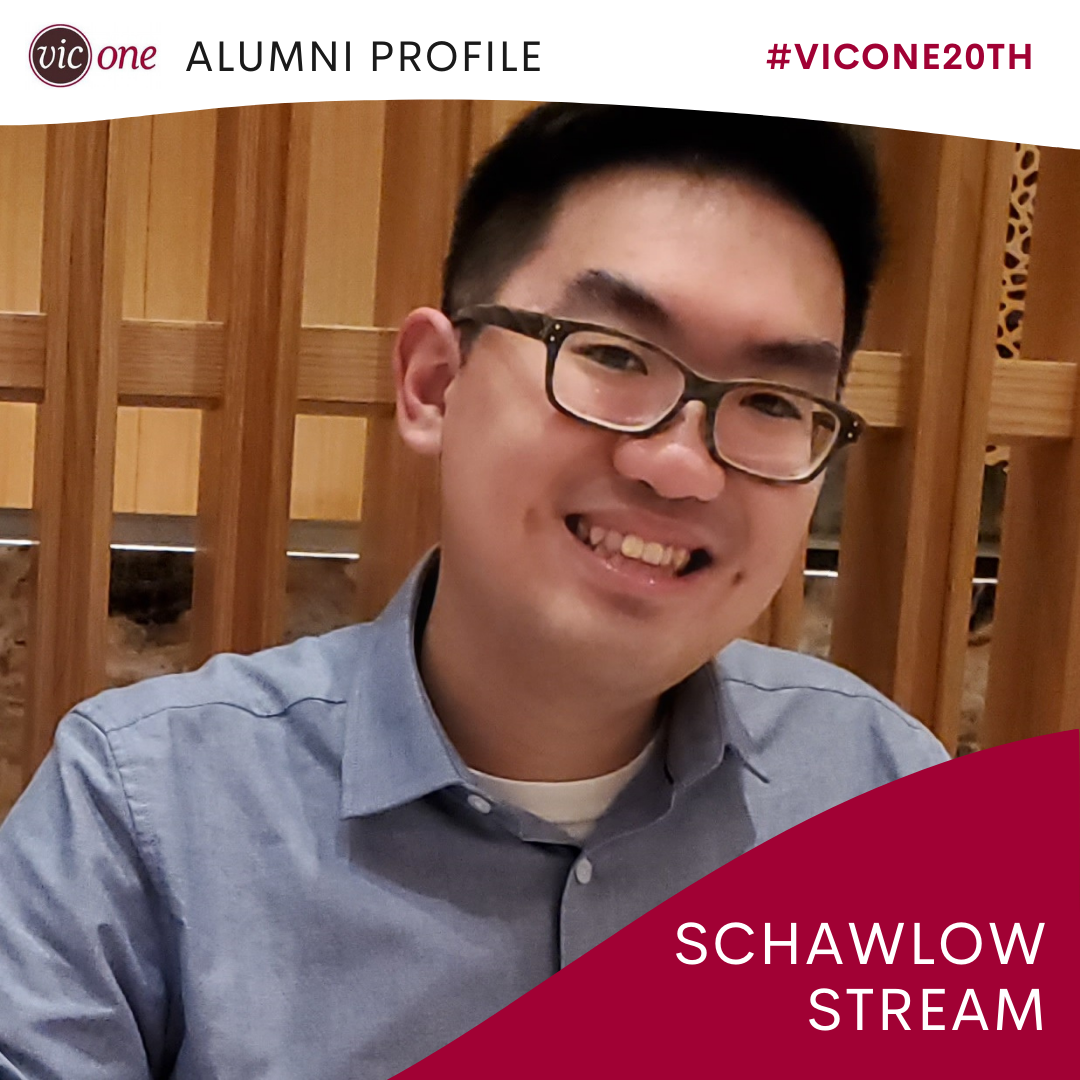
Tell us about what you’re currently doing and/or any accomplishments you would like to highlight.
It's been my privilege the past few years to work at the Innovation Hub, a human-centred consultancy housed in the University's Division of Student Life. The projects we undertake seek to transform UofT by designing with students rather than for students — our research process focuses on empathy-based interviews and feedback sessions to get to the heart of student needs. In my current role, I use my academic background in physics, statistics, and mathematics to complement the predominantly qualitative research with supporting quantitative analysis.
I originally joined the Innovation Hub as the research support writer and editor, where I arrived via my science communication experience. Science communication is a passion of mine, and I've had the pleasure of honing my skillset through leadership roles with UofT groups like the Astronomy & Space Exploration Society and The Varsity. In 2021, I was honoured to win the Science Communication Competition at the Canadian Undergraduate Physics Conference with a short animation I made on Einstein's special relativity.
How did your Vic One experience influence or contribute to your academic and professional goals?
Going into undergrad, I knew that I wanted to contribute in some way to the advancement of science. However, I had a very myopic view of what 'scientific advancement' was, and really only considered the element of academic research. The courses of Vic One's Schawlow stream turned this view on its head for me.
In VIC172: Physical Sciences Today, Professor Emanuel Istrate emphasised the important relationship that the sciences have with broader society and fostered my love for science communication. Through Professor Joseph Berkovitz's VIC173: Philosophy of Science for Physical Scientists, I gained an appreciation for the motivations behind why and how we study science, as opposed to just conducting science as a means to an end. Although I've opted not to pursue an academic career, Vic One has made me a better scientist in attitude, which lends itself as an asset to any sort of analytical profession.
What are your favourite memories of Vic One?
The Vic One plenaries are unlike anything else offered at UofT, and remain one of the best sets of experiences I've had at the University. While there are other speakers' series and guest lectures available, I'm not aware of any that cover the vast extent of subject matter that the plenaries do, nor provide direct engagement access to such an impressive array of luminaries in so many fields. As someone with a chaotic range of interests, it was really a pleasure to learn something so different yet so interesting at every plenary session, and the variety is something I sorely missed throughout the rest of my studies.
What advice would you offer to your past self/current and future Vic One students?
Get to know your Vic One peers, both in and out of your stream! Within your stream, many of them will be in the same courses as you, so you might as well build academic connections that way. At the same time, being in Vic One means that all of your peers have the same breadth of interests that you do, enabling you to relate in more areas than just coursework. I expect that the friends I made in my stream will be friends for life.
As a Schawlow student, I was also able to befriend many Stowe-Gullen students due to our having similar interests in the sciences. However, I wish I took the opportunity to interact more with members of other streams. There are so few chances to interact with students of other disciplines throughout undergrad, so one should really take advantage of the amazing opportunity Vic One presents to do just that.
